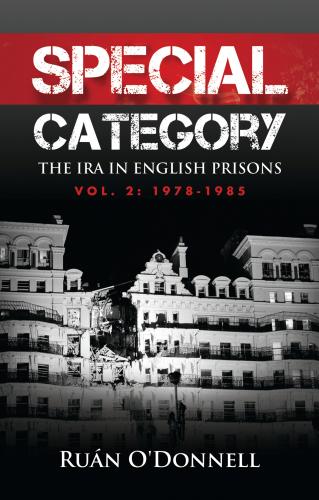197.Clarke and Johnston, McGuinness, p. 110. See also Irish News, 23 March 1979.
198.Clarke and Johnston, McGuinness, p. 111. Police agent Sean O’Callaghan reportedly ‘co-operated’ with Kathryn Johnston in producing his autobiography in 1998. Johnston and her husband Liam Clarke co-authored the McGuinness biography which advanced the controversial theory of Keenan’s arrest. Clarke wrote for the Sunday Times which defended a libel action taken by Armagh republican Thomas ‘Slab’ Murphy with the aid of O’Callaghan and other witnesses. Irish News, 30 April 1998 and Sunday Times, 30 June 1995.
199.Brian Keenan, 26 May 2007.
200.Bell, Secret Army, p. 472. See also Nick Van Der Bijl, Operation Banner, The British Army in Northern Ireland (Barnsley, 2009), p. 112.
201.Guardian, 26 June 1980 and Clarke and Johnston, McGuinness, p. 111.
202.Brian Keenan, 26 May 2007.
203.Irish News, 26 March 1979.
204.Irish Times, 28 May 2008.
205.Alan Simpson, Duplicity and deception, Policing the Twilight Zone of the Troubles (Kerry, 2010), p. 65. Simpson claimed that Keenan was partly motivated by a ‘personal grudge’ arising from his acting as Shop Steward in the Grundig plant managed by Niedermayer. Ibid. In 1959–60 Keenan worked for English Elective (Guided Weapons Division) which manufactured the Thunderbird SAM in Luton. Brian Keenan to ‘Peter Flynn’ (Seamus O Mathuna), 10 December 1983, Private Collection (O Mathuna). See also Bernard Fitzsimons (ed) Weapons and Warfare (New York, 1978), Volume 23, pp. 2489–2490.
206.Simpson, Duplicity and Deception, p. 186.
207.Brian Keenan, 26 May 2007.
208.‘Behind closed doors, RTE One TV, 1 January 2010. Callaghan was conscious of his Irish heritage and often visited the Glandore, west Cork, holiday home of his son-in-law, Peter Jay. The appointment of Jay as Britain’s ambassador to the US in 1977 was controversial. Irish World, 21 May 1977.
209.See contributions of Gerry Fitt MP to the biannual debate on the PTA. HC Deb 21 March 1979 vol 964 cc1505–624 and Mason, Paying the price, p. 223. Judge Harry Bennett investigated allegations of police brutality in Castlereagh Interrogation Centre and Gough Barracks, Armagh. Dr. Robert Irwin, police surgeon with the RUC, claimed that ‘roughly 150–160 prisoners have shown themselves to me with injuries which I would not be satisfied were self-inflicted’. Cited in Bell, British Labour and Ireland, p. 19. Information provided by republicans suggested H5 in Long Kesh contained 134 prisoners of 140 on the Blanket protest in March 1979. It was claimed that eighty-three republicans had been assaulted in late 1978. Faul and Murray, H Block, p. 65.
210.See Bell, British Labour and Ireland, pp. 1–2 and AP/RN, 14 May 2004. Fitt heavily criticized Roy Mason during the debate. In a patronizing and inaccurate account Mason claimed that Maguire was shamed into abstaining by Fitt’s speech and was ‘an amiable boozer whose contribution to Parliament was roughly nil. That he’d managed to get himself elected at all was a mystery’. Mason, Paying the price, p. 223. See also Ibid., p. 216. For Maguire’s earlier interest in the Albany situation see Irish Post, 15 January 1977. Maguire visited Armagh Prison and Crumlin Road Prison on 2 July and 23 July 1979 respectively. Fr. Denis Faul and Fr. Raymond Murray, The British Dimension, Brutality, Murder and Legal Duplicity in N. Ireland, Booklet, November 1980, pp. 50–51.
211.See Geoffrey Bell, Troublesome Business, The Labour Party and the Irish Question (London, 1982), pp. 131–4.
212.For internal Labour Party and Conservative Party manifesto issues see Roy Hattersley, Fifty Years On, A prejudiced history of Britain since the war (London, 1997), pp. 269–75.
213.Seamus O Mathuna to Ruan O’Donnell, 14 April 2012, Private Collection (O’Donnell).
214.Holland and McDonald, Deadly Divisions, pp. 137–40, 236, Observer, 1 April 1979 and Potter, Testimony to courage, p. 213. Neave favoured a hard line in Ireland: ‘There must be change in security tactics. The Army and the local security forces must be released from their present low profile and go on the offensive … The time is ripe to smash the Provisional IRA’. Cited in Desmond Hamill, Pig in the middle, The Army in Northern Ireland, 1969–1984, (London, 1985), p. 198. See also Lost Lives, p. 779 and Mason, Paying the price, pp. 226–7.
215.Holland and McDonald, Deadly Divisions, p. 136.
216.HC Deb 3 July 1979 vol 969 c509W.
217.Times, 21 October 1978.
218.Margaret Thatcher, The Downing Street years (London, 1993), p. 415 cited in Bourke, Ideas, p. 414.
219.Alan Clark, Diaries, Into Politics (London, 2000), p. 303
220.Tony Benn, The Benn Diaries (London, 1995), pp. 467–8. Benn’s political diaries recorded: ‘We stood for a moment in Airey Neave’s memory and Shirley Williams suggested sending a letter of condolence, which was agreed. Joan Lestor asked what was meant by an agreed response to terrorism. Did it mean capital punishment? Jim said no’. Ibid., p. 468.
221.Deirdre O’Shea, 2 October 2008.
222.Nick Mullen, 11 March 2012.
223.Armstrong to Wilson, 27 October 1980, Private Collection (Wilson). Armstrong had ‘a few run ins with [Bunting] when he was a Stick [Official IRA member]’. Ibid. See also Lost Lives, pp. 840–41 and Sunday Independent, 12 August 2007.
